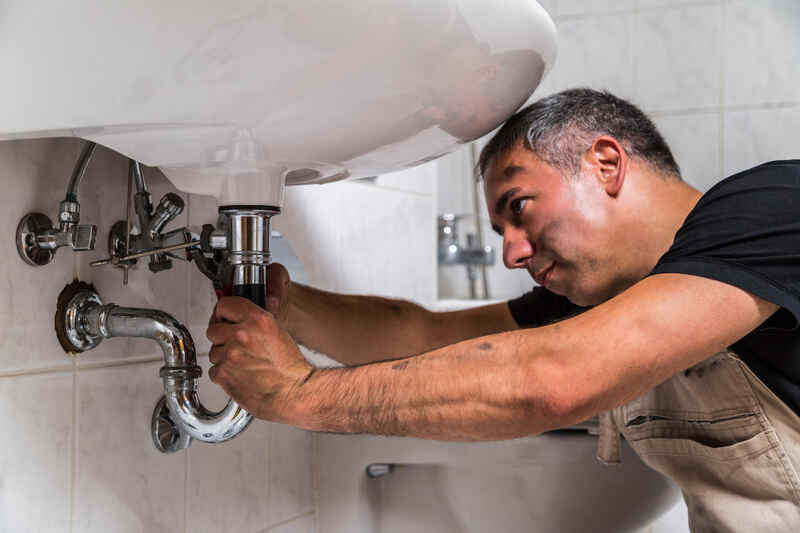How To Get a Plumbing License: Requirements State by State and Tips
Blue-collar jobs in the trades can provide an extremely rewarding career path. And plumbing is one profession that stands out as both fulfilling and well-paid. In fact, plumbers rank in the top 10 highest-paying jobs without a college degree, according to US News & World Report.
If you’re ready to take the plunge and want to know how to become a plumber, here’s your guide. Learn what plumbers do, how long it takes to become one, and the challenges of entering the field.
What Do Plumbers Do?
A plumber is a skilled tradesperson who installs and fixes plumbing systems in homes and businesses. These include water and gas supplies, heating systems, and sanitation units like toilets, urinals, and bidets. A plumber’s duties are the following:
- Install, repair, and maintain plumbing systems in residential and commercial buildings
- Mark positions on walls and floors where pipes and fixtures will be installed
- Cut openings in walls and floorboards to accommodate pipe and pipe fittings
- Measure, cut, bend, and install pipes using hand and power tools
- Join pipes using clamps, cement, or welding
- Test installed pipes for leaks
- Prepare cost estimates for plumbing work
- Read and understand blueprints to determine the layout of plumbing systems and materials needed
RELATED ARTICLE — How To Start a Handyman Business: Startup Checklist
How To Become a Plumber in 8 Steps

How hard is it to become a plumber? It’s a solid career choice, but there’s more than one path to the final destination. This depends on where you live and whether you want to start your own business or work for one.
Here are eight steps to build your confidence and competence in the plumbing profession:
1. Get a High School Diploma or GED
Start by getting a high school diploma or passing the General Educational Development (GED) test. The GED involves passing exams in four key subject areas: English, social studies, science, and math. Successfully passing these tests proves you have the same knowledge as someone who graduated from high school. You need one of these certificates to get into most plumber training programs.
2. Enroll in a Trade School or Certification Program
Sign up for a plumbing certification program at a local college or trade school. These programs offer in-class education and practical skills training.
3. Enroll in a Formal Plumbing Apprenticeship
Enter a formal apprenticeship, which lasts a few years. These programs combine on-the-job training with classroom instruction. You work under experienced plumbers while learning the trade and gaining the experience you need to get a job later.
RELATED ARTICLE — Handyman Services List: 15 General Handyman Services to Offer
4. Join a Union
Joining a union can enhance your apprenticeship experience and provide further training opportunities. Unions give members support and benefits like health insurance, sick leave, and vacation days.
5. Learn Specialized Skills
Acquiring new skills helps to open doors for new opportunities in the plumbing world. Take special courses in pipe system design, installation, and maintenance. You may want to learn proper finishing techniques or prepare and read blueprints.
6. Pass the Required Examinations
Complete any exams necessary for progressing within your apprenticeship and for eventual licensure. Check the requirements in your area to see what you need to do. These tests assess your knowledge of plumbing codes, practices, and theory. They often have both a written and practical component.
FROM ONE OF OUR PARTNERS — How To Become a Licensed Plumber
7. Get a Plumbing License
Apply for and get a plumbing license according to your state’s specific requirements. This may include working a certain number of years of experience and passing state exams. Always check the particular requirements of the state where you intend to work.
8. Commit to Continuing Education
Keep up with new technologies, codes, and standards in the plumbing industry. Continued education and training can lead to more certifications and specializations, which opens doors to new job prospects and higher earnings.
How Much Do Plumbers Make?
In the US, the average hourly wage for plumbers is about $29, according to Indeed. But salaries for plumbers vary a lot, with the lowest reported wage being $16.37 per hour and the highest reaching up to $52.14 per hour. More experienced plumbers or those with specialized skills tend to earn higher salaries.
FROM ONE OF OUR PARTNERS — Commercial Plumbing Services Versus Residential Plumbing Services
How Much Does It Cost To Become a Plumber?
Tuition, fees, and tool costs are usually a few thousand dollars. The exact numbers vary significantly depending on where you live and where you choose to study.
In certain situations, aspiring plumbers get training for free. This is true for those who enter apprenticeships through unions. Union members also earn a salary during their training period, making this the most cost-effective option.
Regardless of your path, you need to consider the cost of tools. Some employers provide the basic tools, but investing in more advanced ones may be required.
RELATED ARTICLE — What Is Bookkeeping? Definition, Types, and Importance of Bookkeeping
How Long Does It Take To Become a Plumber?

Becoming a plumber involves several stages, each offering different levels at which you can work. Here’s what they are:
- Apprenticeship. Right after graduating high school, you can enter a paid apprenticeship program and start working as a plumber’s apprentice. Depending on your state and the program you enroll in, it will take a few years to complete.
- Journeyman Plumber. After completing your apprenticeship, you can apply to become a licensed journeyman plumber. As a journeyman, you can work on your own on residential and commercial projects. At this level, you can either join a plumbing company or start your own business.
- Master Plumber. To become a master plumber, you must work for many years before qualifying for the exam. Each state has different rules, but it could take over a decade to move from beginner apprentice to master plumber. At the master level, you can operate your own plumbing business, get permits to complete projects, and hire other plumbers to work for you.
FROM ONE OF OUR PARTNERS — How To Start a Plumbing Company
Extra Tips To Get Certified as a Plumber
Here are some tips to help you on your journey to becoming a plumber:
- Check Licensing Requirements. Always double-check the specific licensing requirements in your city and state. You don’t want to end up missing an important credential.
- Gain Experience as a Journeyman. Before aiming for higher certifications, work as a journeyman plumber. This experience is invaluable and needed for further certification.
- Get Special Certifications. Look into special certifications in specific areas of plumbing to improve your skills. The more you know, the more you can earn later.
RELATED ARTICLE — Plumbing Pricing Guide: How To Price Plumbing Jobs
Handle Estimates and Payments With Joist
Managing your plumbing business is as essential as that wrench in your tool belt. And it all happens with Joist.
Joist lets you build professional, on-the-spot estimates and invoices. You save time because you can do everything from the work site. Plus, personalized invoices make you look more professional. Get started with Joist.